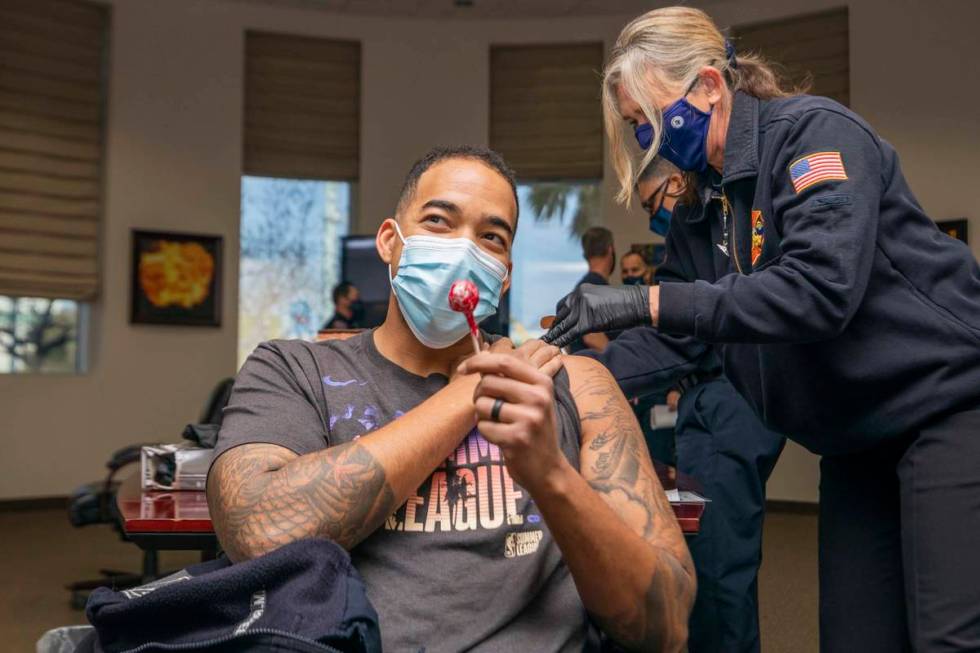Few firefighters, paramedics get vaccine, despite being early on list

Almost three weeks after Las Vegas Valley firefighters became eligible for COVID-19 vaccination, some cities report more than half their workforce haven’t received their first dose, with hundreds declining the shot.
About one-third of Las Vegas Fire & Rescue Department’s firefighters, engineers and paramedics had received the vaccine as of Wednesday. More than half of the department had no appointment to be vaccinated, city spokesman Jace Radke said.
“Scheduling of fire suppression personnel can be challenging due to the shifts that they work and the need to maintain public safety coverage 24/7,” Radke wrote in an email. “Vaccinations for this group are continuing to be scheduled.”
Delays have also stemmed from infected workers recovering from the virus, and outright refusal, city and fire officials say. Vaccination is voluntary.
Whatever the cause, UNLV epidemiologist Brian Labus said the situation is concerning. Firefighters were among the first group of essential workers in Nevada prioritized for immunization after hospital and health care workers.
“We did prioritize those groups for a reason,” said Labus, a member of the medical team advising Gov. Steve Sisolak. “Imagine if we had no fire or police departments. Those are the kind of things we need to keep running all the time because they allow us to function as a community.”
Many firefighters also serve as paramedics, putting them in close contact with patients who may have COVID-19. Because firefighters live together during their multi-day shifts, infection can spread rapidly across a station.
“We’ve had hundreds of our members exposed throughout Nevada,” Professional Fire Fighters of Nevada president Todd Ingalsbee said.
Low percentage getting vaccine
Vaccination rates have varied by local departments, officials report.
In Henderson, about one-quarter had received at least their first dose as of Tuesday, despite the city hosting a vaccine site specifically for emergency medical services and public safety personnel, city spokeswoman Kathleen Richards said. Exactly half of the city’s 242 firefighters had declined the vaccine.
“Fire departments around the country are seeing a similar trend for firefighters and the vaccine,” Richards wrote in an email. “While they are essential healthcare workers, receiving the COVID-19 vaccine is a personal medical decision for everyone, including firefighters.”
North Las Vegas spokesman Patrick Walker reported 37 of 79 city firefighters who also work as paramedics had received their first dose as of Thursday. The city, as well as Las Vegas, did not track how many workers declined to be vaccinated.
“Some have indicated that because supply of the vaccine is limited, they want to wait,” Walker said. “They would rather the available doses go to the public until there is a more robust supply available.”
Clark County reported the best vaccination rate among local firefighters, with more than half having received at least one dose as of Thursday. The department coordinated with University Medical Center in Las Vegas to vaccinate its workforce in late December.
About one-fourth of county firefighters had declined vaccination.
“I’m happy with where we’re at,” said Chief John Steinbeck, noting a department-wide survey in late December that indicated about half of county firefighters were leaning toward declining vaccination.
To help alleviate concerns, the department gave its staff fact sheets about Pfizer’s and Moderna’s vaccines. It also arranged a webinar with a local hospital physician to address firefighter’s questions.
“The firefighters have started to gain more confidence into the vaccine,” Steinbeck said. “Fire departments are just microcosms of society.”
Indeed, Labus said national surveys have shown Americans are wary to be among the first to take the newly developed vaccines — exactly the situation in which first responders and health care workers find themselves.
“It’s really not all that surprising, unfortunately,” he said.
Scheduling is a factor
Ingalsbee, the president of Professional Fire Fighters of Nevada, said uneasiness about the safety of the vaccines is not the only thing holding back firefighters from vaccinations.
“I think our scheduling plays a factor in it,” he said. “It limits the days we’ve actually been available (to be vaccinated).”
At the Las Vegas Fire & Rescue Department, where Ingalsbee works, many firefighters work 48-hour shifts. They can’t take the vaccine while on the clock or within two days of starting their next shift, in case they get even mild side effects that could prevent them from working, Ingalsbee said.
If firefighters could get vaccinated at their station when they completed their shift, it could speed up the vaccination process, Ingalsbee theorized.
He and city officials agreed that some firefighters haven’t been vaccinated yet because they recently had COVID-19. Federal guidelines recommend that anyone who has received monoclonal antibodies or convalescent plasma treatment cannot take the vaccine for 90 days.
There’s no one solution to solve the multifaceted problem, Ingalsbee said. However, he said education campaigns like the one held by Clark County could be useful in raising vaccination rates.
In Northern Nevada, where departments are seeing higher vaccination rates, health officials are enrolling firefighters to help give vaccination shots. Becoming more familiar with the medicine is making them more comfortable with it, Ingalsbee said.
“I think anybody is more educated, anytime we increase accessibility, it will improve the situation,” he said.
Contact Michael Scott Davidson at sdavidson@reviewjournal.com or 702-477-3861. Follow @davidsonlvrj on Twitter.